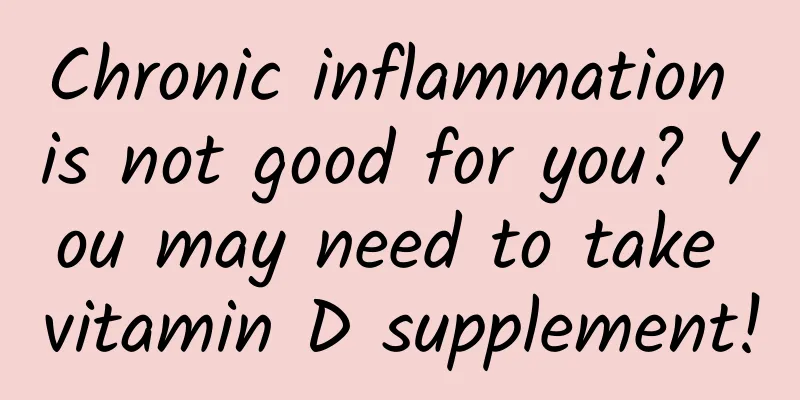Chronic inflammation is not good for you? You may need to take vitamin D supplement!

|
The sun was so elusive this late fall that I couldn’t see a single sign of it showing up for days in a row. I couldn’t help but think of what my parents used to teach me when I was a kid: get more sun, get enough vitamin D! Source: unsplash As my parents kept nagging, I began to wonder: Why do people need to supplement vitamin D? 1.What is vitamin D? We are all familiar with the term vitamin D, but most people are not very clear about what it is. Vitamin D is a steroid derivative, which is a substance necessary to maintain the normal physiological functions of the body. Although the human body's demand is very small, it plays an important role in regulating the metabolism of substances. There are many types of vitamin D, including vitamin D1, D2, D3, D4 and D5. Among them, vitamin D2 and vitamin D3 are the most closely related to human health. Vitamin D2 comes from plants. When the body digests food, the vitamin D2 in it will merge with fat and be absorbed in the small intestine and enter the human blood circulation. Vitamin D3 Source: wiki 2. The relationship between vitamin D and inflammation Human beings have been studying and exploring vitamins since the late 19th century, and it has a history of more than a hundred years. People have discovered many functions of vitamin D, including anti-rickets, anti-osteomalacia, cancer prevention, diabetes prevention, and improvement of schizophrenia. Recently, there has been new progress in our understanding of vitamin D. In May this year, scientists from the Cancer Research Institute of the University of South Australia and other institutions pointed out in a paper published in the International Journal of Epidemiology that vitamin D and chronic inflammation are closely related. Source: International Journal of Epidemiology The researchers recruited more than half a million volunteers through the UK Biobank, aged between 37 and 73. After shielding the influence of the volunteers' own British ancestry, the researchers conducted statistical analysis on 300,000 samples. Source: International Journal of Epidemiology The researchers chose C-reactive protein (CRP) as an indicator of the body's inflammation level. As shown in the figure above, as the level of 25-hydroxyvitamin D (25 (OH) D) in the volunteers' serum increased, the proportion of C-reactive protein decreased rapidly. The data in brackets are standard values, the data in red circles represent vitamin D content, and the last set of data is CRP content. Source: International Journal of Epidemiology Combined with the data from the blank control group, it was found that when the vitamin D level reached the normal level of normal people, further increasing the vitamin D content had little effect on the C-reactive protein ratio. Through this trend of change, researchers tell us two pieces of information: 1. When vitamin D is deficient, taking vitamin D can lower the C-reactive protein ratio and reduce inflammation. 2. For people who are already deficient in vitamin D, taking vitamin D can effectively reduce inflammation and have certain benefits to their health; however, for ordinary people with normal vitamin D levels, there is no obvious benefit from taking vitamin D. In addition, excessive vitamin D can lead to vitamin D poisoning, which in turn causes increased blood calcium and produces symptoms such as anorexia, irritability, convulsions, frequent urination, and arrhythmia, which harm the human body; it can also excessively suppress inflammation and cause adverse consequences. 3. What are the consequences of ignoring inflammation? Inflammation is one of the diseases that torment us the most. For example, some people are troubled by rhinitis and want to carry ten packs of tissues every day. But in fact, inflammation exists not only to torment humans, but also to defend against microbial infection. When a certain part is infected, the body will launch an indiscriminate attack on that part, which we think is "inflammation". Source: wiki If inflammation is ignored, microbial infection may further expand, and then induce vascular damage, serious body lesions, and even long-term chronic inflammation can induce cancer. Therefore, we must treat inflammation with caution and moderate, and accurately identify the cause of inflammation. 4. Which foods are richer in vitamin D? Putting aside the special vitamin supplement pills, scientists in Chinese academic electronic journals have listed several foods rich in vitamin D. The top of the list is salmon and tuna . Most fish contain a certain amount of vitamin D, but these two types of fish are particularly rich in vitamin D. Source: wiki Secondly, there is formula milk , which can be fortified with vitamin D; in addition, some plants contain ergosterol, which can be converted into vitamin D2 under ultraviolet light, which is beneficial for human intake of vitamin D. Source: unsplash Through today's understanding, we know that everything has two sides - it is indispensable, but too much is as bad as too little. The general public may not know much about medical knowledge, but they need to have a scientific concept - to pay attention to all diseases and drugs, and to ensure moderation. |
<<: Elderly people should remember these 5 principles when exercising in autumn and winter
>>: Which part of our body is the "itchy spot"? Why did evolution leave this human weakness?
Recommend
What is second-category e-commerce and what should second-category e-commerce do?
The so-called second-tier e-commerce is broadly d...
Desktop CPU + desktop-level graphics card. How powerful is the world's most powerful gaming laptop?
Gaming experience has always been an important us...
IQVIA: Global Drug Use Report 2022
Despite the uncertainty created by the global pan...
How much does it cost to join a nail art mini program in Luliang?
How much does it cost to join a nail art app in L...
Analysis of competitive products in couple social APP operation strategy
1. Analysis of main functions Function and analys...
14 Best-selling School Bags Review: Which One Can Protect Your Backbone? Which One Is More Durable?
It is the beginning of the new school year. For p...
The life cycle of weak
The life cycle of weak We all know that weak refe...
8 routines = 1 "Internet celebrity" brand
In 2021, the concept of "new consumption&quo...
The shocking Pillars of Creation, what is happening there?
The Pillars of Creation refers to a part of the E...
I didn’t know that “air conditioning water” had so many wonderful uses…
1. Irrigation of household plants The condensed w...
Are you addicted to cats and dogs? Beware of the "hidden killers" in your pets
Excerpted from: Inside and Outside the Classroom ...
This common medicine at home is abused by many people! Be careful of 4 situations →
Erythromycin ointment It is a common medicine in ...
People in Beijing and Tianjin have been "infected"! Don't swat this insect if you find it
"Is this a rove beetle? I've never seen ...
The formula for hit products created by internet celebrities!
Li Ziqi became popular on YouTube. This is not cu...
Say Goodbye to Singleness: When Love Knocks on the Door Baidu Cloud Download
Say Goodbye to Singleness: When Love Knocks on th...









